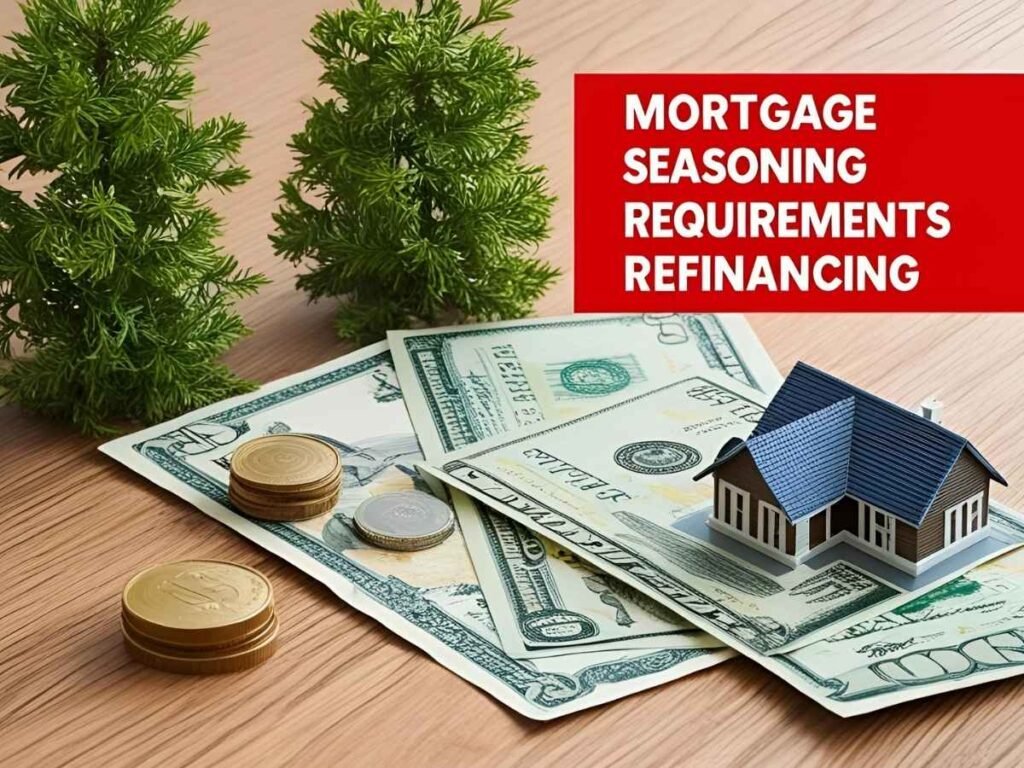
Mortgage seasoning is a crucial concept for homeowners looking to refinance. Whether you want to lower your rate, tap home equity, or change loan terms, understanding seasoning requirements can help you time your refinance for maximum benefit and avoid unnecessary delays. This guide explains what mortgage seasoning is, how it applies to different loan types, and what you need to know to qualify for refinancing in 2025.
What Is Mortgage Seasoning?
Mortgage seasoning refers to the minimum amount of time you must wait after closing on your current mortgage before you can refinance. Lenders and loan programs set these requirements to ensure loans are not refinanced too quickly, which could increase risk or impact lender profitability.
Standard Seasoning Periods for Refinancing
Conventional Loans (Fannie Mae & Freddie Mac)
- Rate-and-term refinance: Most lenders require at least six months (six mortgage payments) from the original loan closing before you can refinance.
- Cash-out refinance: You typically must wait six months after closing before you can access home equity through a cash-out refinance.
- No prepayment penalty: You can technically refinance sooner, but most lenders will not approve a new loan until the seasoning period is met.
FHA Loans
- Rate-and-term refinance: FHA generally requires a six-month seasoning period before refinancing.
- Cash-out refinance: FHA also requires that you have owned and occupied the property for at least 12 months before a cash-out refinance is allowed.
VA Loans
- Interest Rate Reduction Refinance Loan (IRRRL): The VA requires that at least six consecutive monthly payments have been made, and 210 days must have passed since the first payment due date.
- Cash-out refinance: The same six-month/210-day rule applies, and you must have made all payments on time.
USDA Loans
- USDA typically requires a 12-month seasoning period before you can refinance, especially for streamlined programs.
Why Do Seasoning Requirements Exist?
- Lender Risk: Seasoning helps lenders reduce risk by ensuring you have a payment history on your current mortgage.
- Regulatory Compliance: Government-backed loans (FHA, VA, USDA) impose seasoning to prevent rapid refinancing and potential abuse of loan programs.
- Profitability: For conventional loans, lenders may face financial penalties if a loan is paid off or refinanced within six months of origination.
Exceptions and Special Cases
- No-Seasoning Scenarios: Some lenders may allow immediate refinancing if you’re not taking cash out, but this is rare and may come with higher costs or stricter underwriting.
- Cash Purchases: If you purchased a home with cash, you may only need to wait six months before doing a cash-out refinance.
- Refinancing After Adverse Events: If your original loan followed a foreclosure or short sale, additional seasoning (often 12 months) may apply.
Additional Seasoning Considerations
- Down Payment and Closing Funds: Lenders often require that funds used for your down payment or closing costs be “seasoned” in your bank account for at least 60 days to ensure they are not borrowed.
- Loan Modifications: If your loan was recently modified, seasoning requirements may reset, and you’ll need to make six consecutive on-time payments before refinancing.
How to Prepare During the Seasoning Period
- Make All Payments On Time: Lenders will review your payment history closely. Missed or late payments can reset your seasoning clock, especially for VA and FHA loans.
- Monitor Market Rates: Use the seasoning period to watch for favorable interest rates and calculate potential savings.
- Gather Documentation: Keep records of your mortgage statements, bank statements (to show seasoned funds), and any communications with your lender.
Frequently Asked Questions
Can I refinance before six months?
Technically, you may be able to, but most lenders will not approve a new loan until the seasoning period is met. Some exceptions exist for special circumstances, but expect higher scrutiny and possible fees.
What if I want to do a cash-out refinance?
You must own the property for at least six months (sometimes 12 for FHA) before you can take cash out, and you must meet all other equity and credit requirements.
Does seasoning apply to all types of refinances?
Yes, but the specific period and requirements vary by loan type (conventional, FHA, VA, USDA) and whether you’re doing a rate-and-term or cash-out refinance.
Final Thoughts
Mortgage seasoning requirements are a key factor in refinancing eligibility. For most homeowners, expect to wait at least six months and make six on-time payments before you can refinance, with longer waits for cash-out or government-backed loans. Use this time to strengthen your financial profile, monitor rates, and prepare documentation to ensure a smooth refinance process. Always check your specific loan type and lender guidelines to confirm the exact seasoning rules that apply to your situation.